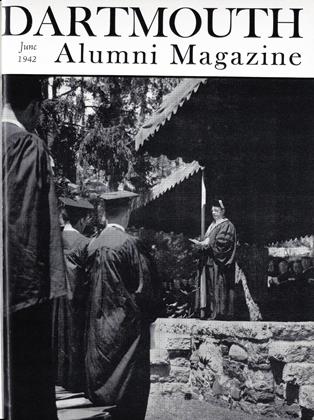IN HIS REMARKS before the Alumni Council last month Mr. Edgerton, treasurer of the College, spoke of the alarming tax legislation proposed in Washington for removing the exemption of colleges, churches, hospitals, and eleemosynary institutions from Federal estate tax laws. The proposal sets a ceiling on amounts of gifts. Also proposed in Washington, in the new income tax bill, is a provision that may tax all institutions deriving income from their operations, which might include income from investments and real estate and other sources. If the legislation is not at least postponed until there is ample opportunity provided for national understanding and discussion of the proposals then these institutions face the threat of government control and all that this implies.
ARTHUR KROCK, distinguished columnist . for the New York Times, wrote recently under the heading "A Move Toward Federal Subsidy of Colleges?" Mr. Krock has given us permission to reprint here his statements on this problem, which is so little understood even by men and women whose institutions would be drastically affected. We quote from Mr. Krock:
"More than a month of study by collegiate and charities executives of a Treasury proposal to the Ways and Means Committee of the House of Representatives has convinced them that their immediate impression of it was correct—the first blow the Federal Government ever has launched at such institutions, delivered in a time of their greatest trouble. An uprising against the proposal is in train, particularly in the institutions of higher learning, and Congress will be emphatically urged to reject the Treasury's suggestion.
"It was made March 3 by Randolph Paul, tax adviser to Secretary Morgenthau, and asks that limits be set on those deductions against estate taxes now allowed for charitable and educational bequests. Because the present statute has no such limits, the Treasury asserted that 'wealthy individuals are afforded an opportunity to escape all liability under the tax.' Further, it declares, this same class of persons is enabled 'to perpetuate, through charitable trusts and corporations, family control over their wealth without paying the estate tax.' "
ITS IMPACT ON CHARITIES
"The impact of the proposed limitation would fall heavily on churches, hospitals, colleges and similar charitable or educational institutions. It would demolish the fiscal foundations on which they have been set for more than a hundred years, and in the instance of charities would penalize the source instead of the use of their revenues.
 View Full Issue
View Full Issue
More From This Issue
-
 Article
ArticleCollege Graduates Return
June 1942 -
 Class Notes
Class Notes1927 Has Its Quindecennial
June 1942 By DOANE ARNOLD '27 -
 Class Notes
Class Notes1937 Holds Its Fifth Reunion
June 1942 By JOHN H. DEVLIN JR. '37 -
 Class Notes
Class Notes'Seventeen's Silver Jubilee Wins Cup
June 1942 By MOTT D. BROWN JR. '17 -
 Article
ArticleValedictory to Class of 1942
June 1942 -
 Article
ArticleFirst War Class Graduates
June 1942
Article
-
 Article
ArticleINTERESTING EXHIBITS IN LIBRARY
June, 1912 -
 Article
Article'24's PRE 25TH REUNION SPRING GET-TOGETHER
May 1948 -
 Article
ArticleFreshman-Sophomore Reading Program
OCTOBER 1958 -
 Article
ArticleTrustee-Faculty Agreement
MAY 1971 -
 Article
ArticleTuck School
MAY 1968 By BOB KIMBALL T'48 -
 Article
ArticleThe Undergraduate Chair
October 1936 By William B. Rotch ’37


